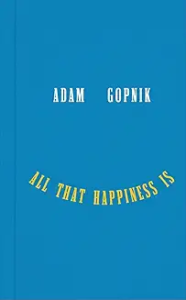All That Happiness Is by Adam Gopnik 2024
Gopnik has been a staff writer for “The New Yorker” for nearly 40 years and is one of my favorite essayists. His books about his family’s year in Paris and time in NYC are classics. In this, his 17th book, he examines the question of what happiness is and how one might ‘pursue’ it, as stated in the Declaration of Independence.
He has two primary messages in this slim and well-written volume. First, he makes the distinction between accomplishment and achievement. The first is a self-directed goal, an attempt by one to master a specific skill or body of information. It carries with it no reward beyond the sense of having done something interesting, difficult, and important. It is recognized by an ‘aha’ moment when the goal is accomplished and one often experiences a sense of ‘flow’ when immersed in the activity. As Donald Hall called it in his book Lifework, ‘absorbedness”.
On the other hand, achievement is largely externally driven and measured. There is a sense of pressure to achieve, and once the goal has been achieved, there is often a sense of disappointment or let down. Sadly, in America today, achievement has largely won out over accomplishment.
The second message in the book is that accomplishments, despite their basis in individual’s interests, are made more possible in a pluralistic society where the interdependence of individuals is enhanced by group cohesion, support and approval. This, sadly as well, is a diminishing resource in America today, witness Robert Putnam’s “Bowling Alone”.
Gopnik points out in the final chapter that “while constant happiness is perhaps unachievable or achievable only in bursts and bits….bursts of delight do arise, regularly compounded of exhilaration, meaning, poignant pleasure, often sharp-edged desire. We seem to pursue those best by pursuing them indirectly… Our accomplishments mark the sum of our happiness experienced—and that is the one kind of achievement worth achieving…What we can do is to make space, every day, for the sheer pleasure of learning new things…..All that happiness is. It is the escape from the self into the another, whether the ‘other’ is a person, or a system, like a tonal system. that someone else, or many others, have left behind for us to slip into.”
Gopnik concludes by quoting Rilke: “Whoever you may be: step into the evening. Step out/of the room where everything is known to you already.” This is good advice. Happiness or primarily its pursuit should be inner driven, shared with others, and quietly satisfying to you, the author of your life. A fine book!
”



